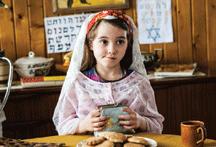
The Kansas City Jewish Film Festival presents its Short Film Showcase, presented by Mini Cinema, on Wednesday, Oct. 14, at The White Theatre and at the Regal Cinemas LA Live in Los Angeles, California. The showcase, which is also The Kansas City Jewish Chronicle night, will feature eight award-winning Jewish-themed shorts curated by the KCJFF’s director Shawn Edwards. The event is part of the 17th annual Kansas City Jewish Film Festival which runs Oct. 10 through Oct. 18 at the White Theatre. Mini Cinema is an entertainment Company that introduces critically acclaimed short films to everyday people. The KCJFF and Mini cinema have partnered to produce this Short Film Showcase, which will take place on the same day in two different cities.
“Presenting the short film showcase in Los Angeles is a fantastic opportunity for the Kansas City Jewish Film Festival in terms of credibility and branding on a national level,” says Shawn Edwards the KCJFF director. {mprestriction ids="1,3"}“It’s also a fantastic opportunity for the filmmakers whose films will be seen by many key industry insiders who will attend the event.”
Tickets are $10 for general admission and are available at the White Theatre Box office by calling 913-327-8054 or visiting www.vendini.com/ticket-software.html?t=tix&e=80d828783b14a6fe07e889363179e0d8
Short films showing at the Showcase
‘T On a Technicality’
“On a Technicality” follows five lifelong friends as they deal with relationships, aging, illness, death as they meet weekly for breakfast. Through the span of 10 years they see changes in themselves and each other.
‘Hannah Cohen’s Holy Communion’
Set in Dublin in the 1970s, this film explores a rarely glimpsed Ireland, as seen through the eyes of spirited 7-year-old Hannah Cohen. Hannah can’t wait to make her Holy Communion — only problem is she’s Jewish. An Irish/Jewish film with an international feel, the beauty of the story lies in its simplicity, humor and the universal desire to fit in.
‘German Shepherd’
As a Jew growing up in Baltimore, David Paul’s vision of Germany (and Germans) was shaped by the stories of his Holocaust-survivor mother; later in life, he reflects on whether it is possible to overcome this history. Simple in aesthetics yet potent in philosophical introspection, this animated documentary poses difficult questions about the human capacity to forgive unimaginably evil acts.
‘What We Left Behind’
In 2003, thousands of Jewish religious artifacts were saved from the basement of Suddam Hussein’s intelligence headquarters when American troops entered Baghdad. “What We Left Behind” chronicles the final journey in New York 10 years later (2013) of 49 Torah scrolls and religious documents framed in the turbulent history of Babylonian-Iraqi Jewry.
‘70 Hester Street’
A documentary about director Casimir Nozkowski’s childhood home on the storied Lower East Side of New York City and how much of the past he could still see in it after he left. His story becomes a universal story about all childhood homes and the past lives and legacies of old buildings making room for new ones.
‘Pur’
Rare archival footage shows underground plays staged by groups of Jewish dissidents during the Soviet regime, when all expression of Jewish culture was forbidden. With satire and comedy, the young activists expressed their criticism of the oppressive regime risking lifelong imprisonment, or worse.
‘Reverence’
Batman, Homer Simpson, a New York Yankees logo — you’re likely to see any of these logos on the yarmulke of a Jewish boy in modern Jewish communities today. “Reverence” dissects the meaning and context behind branded kippahs and the concept of faith in a modern world while exploring the societal and religious norms that these garments may challenge, focusing on the notion of “fitting in” and “standing out” within the Reform and Conservative Jewish communities.
‘Demeter’s Spring’
“Demeter’s Spring” draws a portrait of the cemetery at Kibbutz Givat Hashlosha, one of the few secular cemeteries in Israel. It observes the cemetery as it withers and blooms again during one year. Between being and nonbeing, holes are bored open in the earth, “reserved” signs are planted and empty plastic chairs await sitters.{/mprestriction}


